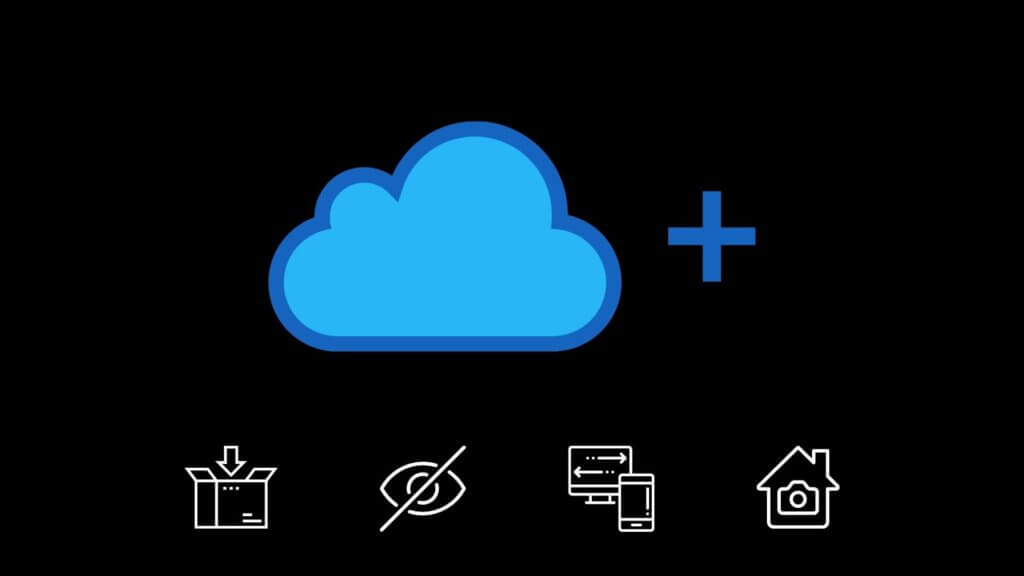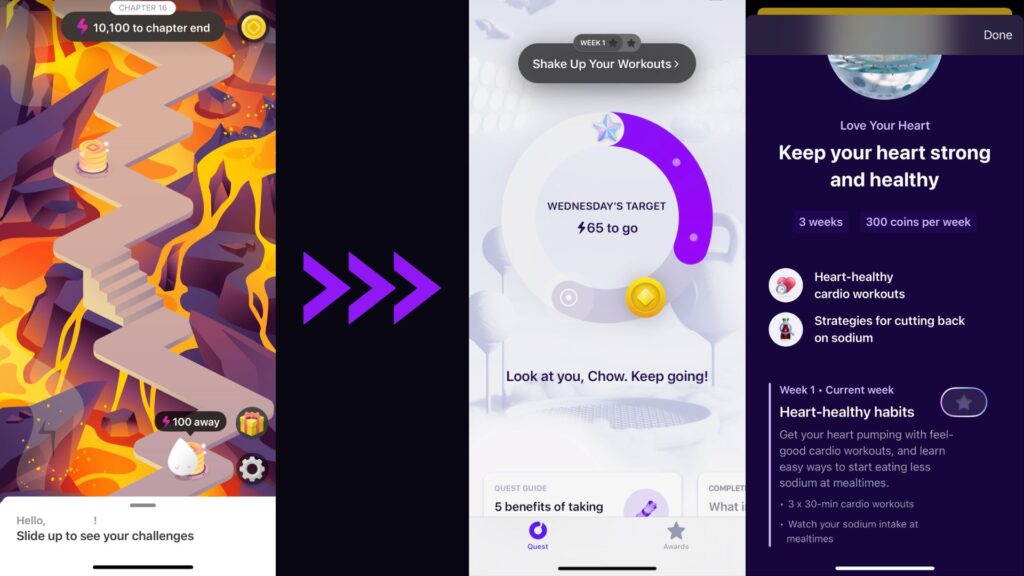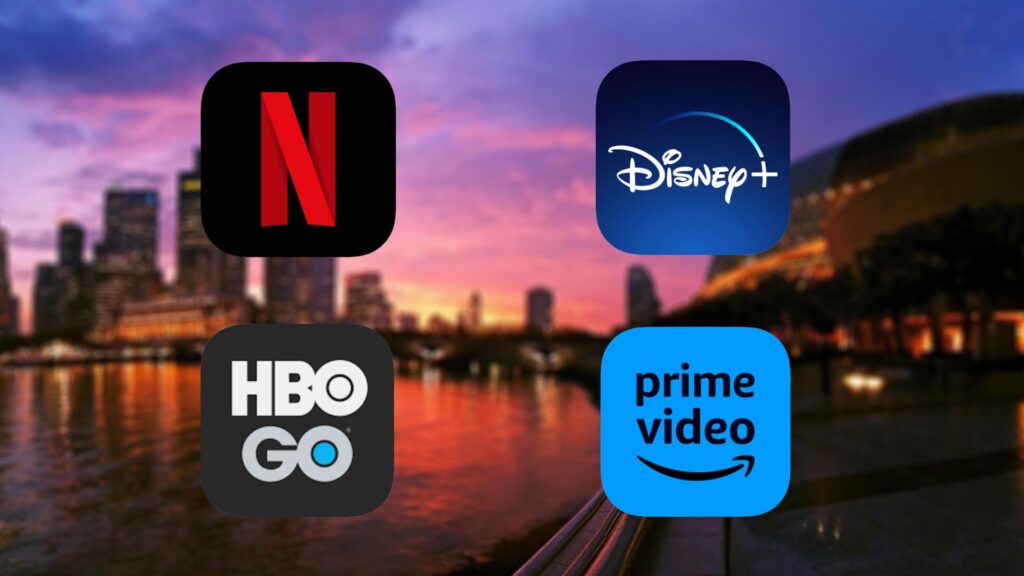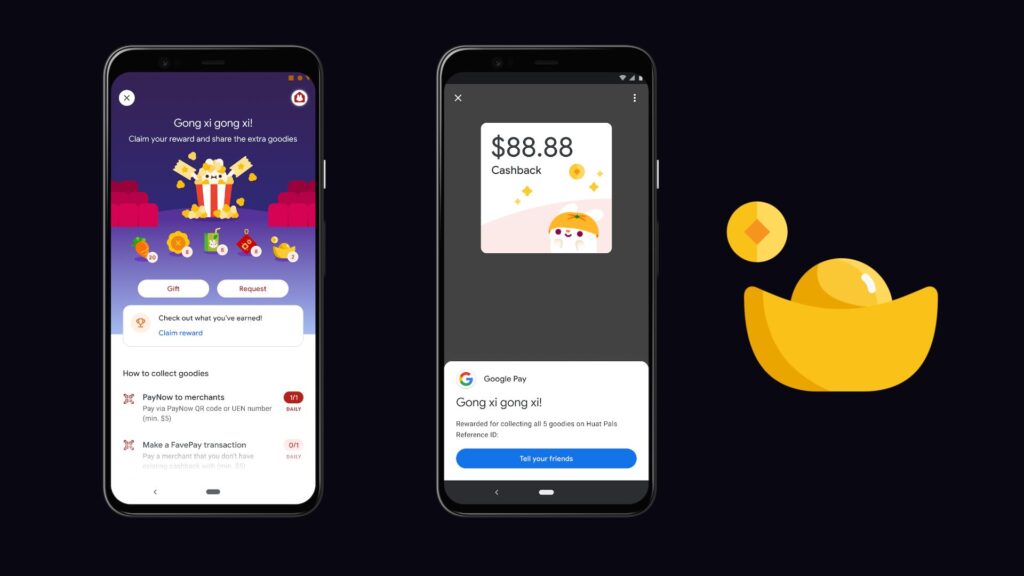“This iPhone cannot be backed up because there is not enough iCloud storage available. You can manage your storage in Settings”. Tired of getting this message after your miniscule free 5GB of allocated iCloud storage is filled by endless screenshots and WhatsApp Backups?
Yeah, me too. Apple would gladly sell you monthly subscriptions to iCloud+ to access a higher storage limit of up to 2TB and get rid of that annoying notification.
Here’s the thing: with this small base storage capacity, important iPhone backups that include your app data, contacts and notes will simply not be completed once iOS detects that there is insufficient iCloud storage.
Let’s do the math: An average person would have a Photo gallery of 3GB to 4GB that would include downloaded TikTok videos and chat screenshots (who even has time to delete them?). WhatsApp chat backups take up another 1GB to 2GB, as part of the iPhone backup.
More often than not, people either dangerously ignore the fact that their app data and WhatsApp chats are never backed up and carry on with life, or simply pay the monthly subscription fee for iCloud+.
For people that chose the latter, let me explain what you are paying for and whether it is worth it in Singapore. For those that chose the former, read on to find out why you shouldn’t continue with this practice.
Whatsapp backups
The first reason to get a higher storage option for iCloud is WhatsApp. WhatsApp still remains the number one messaging app in Singapore, so we still have to deal with the annoying need to back up chat histories.
To make things easier for users, WhatsApp automatically backs up our chats at user-specified intervals to iCloud and Google Drive for iOS and Android users respectively.
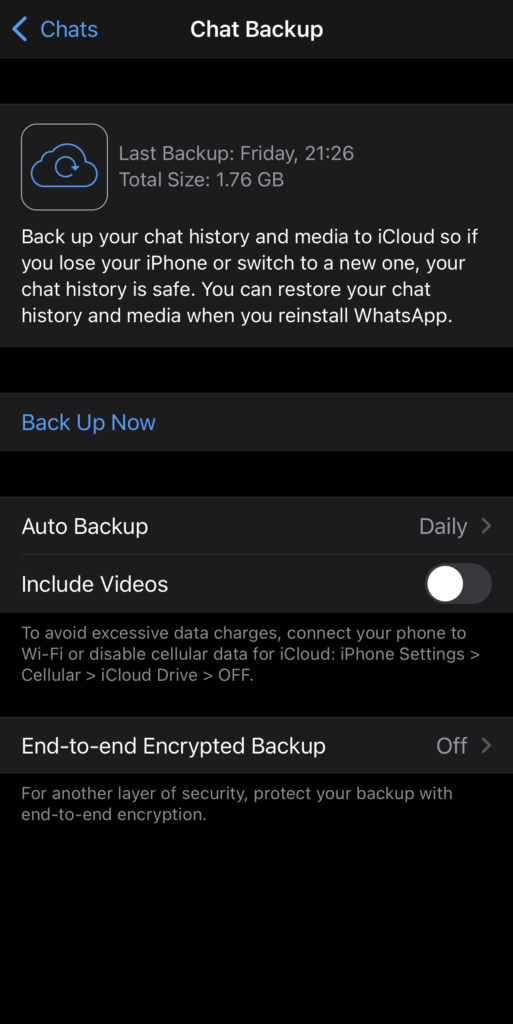
Unlike Android users that have access to free 15GB of Google Drive storage, the likelihood of us iOS users missing our scheduled backup on our free 5GB of iCloud storage due to lack of space is much higher. If we accidentally uninstall WhatsApp or lose our phones, chat histories from the last backup will be lost permanently. Disastrous right?
There is a walkaround if you really don’t want to pay for extra storage: A full iPhone backup on iTunes. Since WhatsApp chat histories are stored under app data, a complete backup file stored on your computer would restore all your important messages.
But who wants to manually plug their phone into the computer for 15 minutes every week just to back up their WhatsApp chats along with their entire phone? It’s simply too much hassle. WhatsApp also isn’t helping by not offering alternative cloud storage solutions for chat histories other than iCloud.
So for those who have important messages and dealings on WhatsApp, either regularly ensure there is space in that 5GB allocation for backups, or just pay for the 50GB plan at S$1.28 to keep your mind off it. It still remains a choice to subscribe, but the state of WhatsApp and lack of practical alternatives to backup make it stubbornly hard not to.
Photos

Another reason why you would get a higher storage option for iCloud is for Photos. As Gen Zs, we take copious amounts of photos of our pets, food, lecture notes, and unglams of our friends, and we never delete them.
Apple automatically backs up these photos onto iCloud so you can view them on every iOS device you own. But again, that 5GB limit, especially with your WhatsApp backups will likely not be enough.
Thankfully, unlike WhatsApp and their sworn allegiance to iCloud, many free cloud storage alternatives like MEGA, Google Photos and Dropbox exist to offload older images from iCloud once the free 5GB limit is nearing. Likewise, you can use iTunes to transfer your media onto your computer for storage.
If you are in the Apple Ecosystem though, backing up your photos and videos onto iCloud can be really convenient. Live photos are natively supported on all iOS devices, unlike most of the alternatives, ensuring you never miss a single moment of every photo. Media is also always backed up at the original resolution without any download required for viewing.
For me personally, I wouldn’t pay for iCloud Storage just for Photos as a smorgasbord of great alternatives for media backups and cheap external storage exist. Besides, I don’t really use Live Photos.
What is iCloud+
iCloud has evolved from being merely a cloud storage service to an entire suite of complementary privacy solutions over the years. Every subscription tier gives you access to iCloud Private Relay (beta), Hide My Email, Custom Email Domain support, and HomeKit Secure Video support on top of Cloud Storage.
| iCloud+ 50GB | iCloud+ 200GB | iCloud+ 2TB | |
| Price per month (S$) | 1.28 | 3.98 | 12.98 |
| Features | 50GB of storage iCloud Private Relay (Beta) Hide My Email Custom Email Domain HomeKit Secure Video support for one camera | 50GB of storage iCloud Private Relay (Beta) Hide My Email Custom Email Domain HomeKit Secure Video support for up to five cameras | 50GB of storage iCloud Private Relay (Beta) Hide My Email Custom Email Domain HomeKit Secure Video support for an unlimited number of cameras |
| Sharing with Family | Yes | Yes | Yes |
Thankfully in Singapore, iCloud+ subscription fees are quite affordable, starting at S$1.28 per month for 50GB. If you are already paying the monthly fee just for the increase in storage, let me break down the additional features you have access to.
iCloud Private Relay (beta)
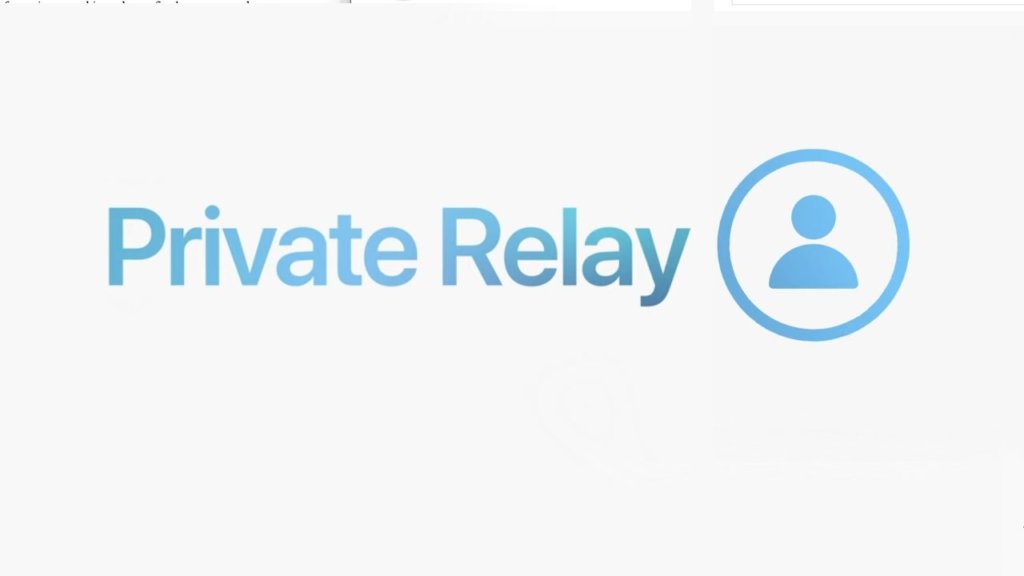
iCloud Private Relay works like a VPN, anonymising your IP Address and DNS records, while ensuring no parties can track what websites you access. This is what Apple explains:
When Private Relay is enabled, your requests are sent through two separate, secure internet relays. Your IP address is visible to your network provider and to the first relay, which is operated by Apple. Your DNS records are encrypted, so neither party can see the address of the website you’re trying to visit. The second relay, which is operated by a third-party content provider, generates a temporary IP address, decrypts the name of the website you requested and connects you to the site. All of this is done using the latest internet standards to maintain a high-performance browsing experience while protecting your privacy.
If it works as well as traditional VPNs do, then surfing the web anonymously has just become substantially cheaper. You see, subscription prices for popular VPN Services in Singapore average around S$5 to S$7 per month, compared to the starting price of S$1.28 per month for iCloud+.
However, iCloud Private Relay does not allow you to specify an IP address of a geographical location of your choosing, so there is no luck in unlocking region specific Netflix shows or websites. Further, this service is in beta, so some websites may display content for the wrong region or require extra steps to log in.
Hide My Email
Are you annoyed by the incessant marketing emails from companies you don’t even remember giving your email to? What’s worse, there is no “unsubscribe” button for you to click at the bottom of dodgy emails, so you are stuck receiving spam from different addresses that pass through the spam filters.
In this day and age, it is not uncommon to see your email address being exposed through data leaks from even the most reputable companies like Facebook and LinkedIn. These hackers would then sell our email addresses to seedy marketing firms to clog up our inbox.
One way to avoid this is to create a separate burner email when signing up for one-off online accounts, or on newer websites you want to take precautions on. Sure, that works for a period of time. But when spam and newsletters start kicking in, who even has time to check that burner email for important information anymore?
Apple’s Hide My Email service offers the best of both worlds: Create single-use disposable email addresses that forward emails to your main inbox, eliminating the need to check multiple inboxes.
When you start receiving spam or unwanted marketing forwarded by the disposable email address, simply disable it in iCloud settings and you’re done. No need to hit the unsubscribe button at the bottom or block anyone.
Hide My Email is built into Safari. When you come across a sign up page asking for your email, a “Hide My Email” button appears at the top of your keyboard. Upon clicking on it, a randomly generated icloud email will be created and filled into the form.
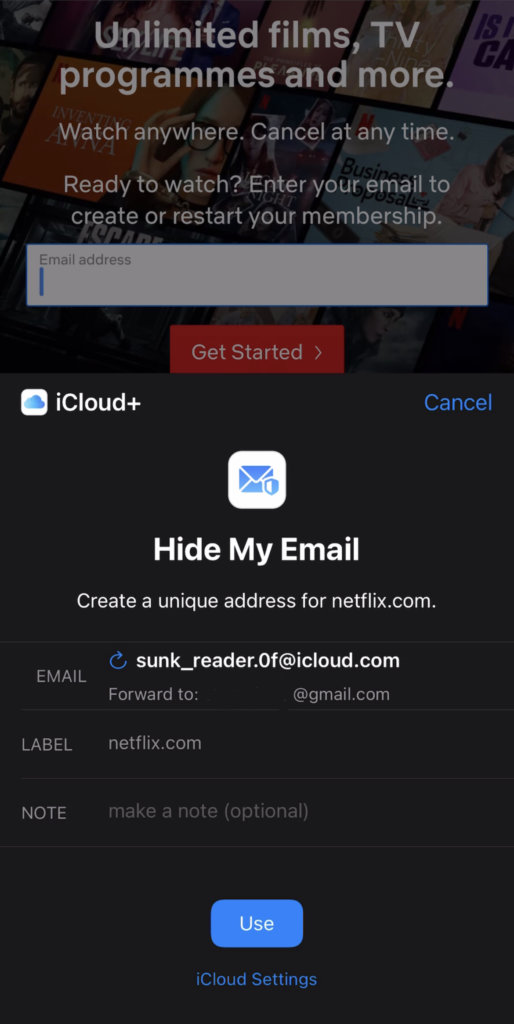
This disposable email address can be managed in iCloud settings. You can also manually generate up to an unspecified amount of disposable emails for any accounts you like, and store notes to remind yourself what each email is for.
As this feature is included even in the S$1.28 tier, it reigns supreme over competitors like Bump and 1Password who offer similar services at much higher monthly prices. I personally use Hide My Email for more than 10 accounts, and had never experienced any missed or delayed emails, so there’s that.
Custom Email Domain
This feature is not really applicable to most of you guys, so I’m only going to touch on it briefly. An internet domain refers to the identification of a unique person or organisation like google.com, apple.com, or techcomposition.com .
Domain owners like us are able to create custom email addresses like [email protected], or [email protected] with our registrar to send emails with. But most of the time, these emails are sent through our domain registrar like GoDaddy and NameCheap instead of common email providers like Gmail and Yahoo.
We would technically have to go into the email portal of our registrar to send these emails. But Gmail for the longest time has enabled us to send and receive emails on our custom domains for free, albeit with some delay in email pulling.
What iCloud+ is offering is the exact same service Gmail and others offer, but on the native Mail app on iOS and MacOS. That’s it.
Conclusion
Now for the golden question: Is iCloud+ worth it in Singapore? I would say yes, but only for the S$1.28 per month 50GB tier. The higher storage offerings are expensive in the long run when compared with the constantly falling price of offline hardware drives.
The dominance of WhatsApp in our local lives cannot be understated, and the backup situation just forces you to get more cloud storage out of convenience. With all the important messages, photos and screenshots we are sending in these groups, the backup size can easily balloon to ridiculous sizes.
Other than our WhatsApp chats, contacts, call logs and regular messages also need to be kept in the cloud for future reference. If we don’t want to plug our iPhones into the computer for local backups every week, the S$1.28 paid per month is justified.
The added bonuses of Hide My Email and Private Relay are just the cherry on top. Hide My Email is arguably the best for its price and feature set for spam prevention, and Private Relay helps take browsing privacy to industry standards.
Even if you don’t care about these features, 50 GB of cloud storage for your entire iPhone’s data at the price of a Teh C a month is worth it.
Derrick (Yip Hern) founded Tech Composition to provide valuable insights into the tech and finance world. He loves to scour the web for the best deals and embark on software projects during his free time, a typical geek, right?
